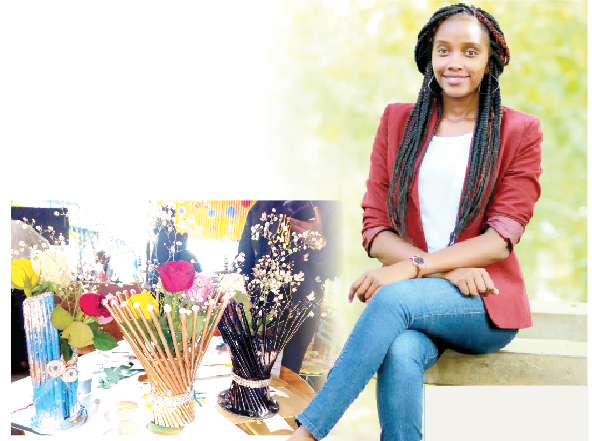Youth uses art to fix waste menace
By ANN NYATHIRA, February 25, 2020PERPETUAL WANJIKU combined her love for the environment and art into a network of individuals on a mission to reduce trash and train young people to appreciate their world
For a very long time, art has been helping society overcome the huge gap between problems and actions. It is no different today. Where fact and figures lose influence, artwork can still have an impact.
This was the thinking of 22-two-year old Perpetual Wanjiku who founded the Creative Waste Network to create art, not for art’s sake, but for the planet’s. She wanted to highlight the plastic pandemic through powerful impact of art.
“Art has long been used as a powerful creative tool for social activism. I founded Creative Waste network intending to reduce, reuse and recycle solid waste and create art such as home décor, accessories and office tools. The world is literally drowning in plastic waste and the Kenyan population is increasing drastically, which translates to an increase in consumption. Sadly, they don’t care how they dispose of their solid waste,” says Wanjiku.
Floating plastic
With plastic pollution and climate change at the forefront of almost everybody’s minds, Wanjiku and the six creative members, all with different backgrounds, create work that is not only beautiful, but also serves as a stark reminder of the impact of waste on the planet and inhabitants.
The combination of passion in art and environmental conservation and protection, Wanjiku decided to pursue a course in environmental studies.
She was inspired by the discovery of a huge floating gyre of plastic waste in the pacific in the late 1980s and the reality that although people were shocked, it was not enough to change their consumption habits. When whales died and washed ashore with stomachs full of plastics, people were horrified and when photographs of beaches with plastic trash were published, people were disgusted.
All this got on her nerves, and she decided to come up with a solution to help redeem the situation and be part of the change she wanted to see.
“People often complain about pollution, but do not do anything to change the situation. I was tired of complaining when people littered the environment and decided to take action. And for me solid waste management seemed like the best option since it is a problem experienced not just in Kenya, but other countries too,” she says.
For her, solid waste pollution is so much bigger than the behaviour of individual people, and although efforts are in place to eliminate such waste at both individual and corporate level, a lot needs to be done.
“Recycling and reusing provides an economical alternative to heavy industry and most of our materials we get from homes, friends, neighbours, and events such as parties where we end up collecting plastic bottles, cups, spoons, newspaper, cartons and sometimes clothes and any other things that can be turned into art. The weirdest part is most of the time people do not realise most of our pieces are from what an individual threw away since it was useless to them,” says Wanjiku.
Going full scale
Globally, one million plastic bottles are bought every minute and only nine per cent of plastics produced are recycled because of lack of recycling technologies that can make virgin-quality products from plastic waste. This inspired Wanjiku to go to schools and teach pupils about solid waste management and how it impacts climate change.
“Since the Competency-Based Curriculum was introduced, we have managed to go to schools and trigger the minds of these young ones into believing they can change the world in their own little ways. We teach them how they can use art to conserve the environment. We want them to see the importance of their actions at a tender age,” says wanjiku.
Wanjiku highlights one of their major challenges as material acquisition due to lack of proper disposal methods. “Sometimes getting these materials can turn cumbersome since we all dispose of things differently, but we manage. What I can say is our greatest challenge is funds that can sustain this project and turn it large scale,” says Wanjiku.
